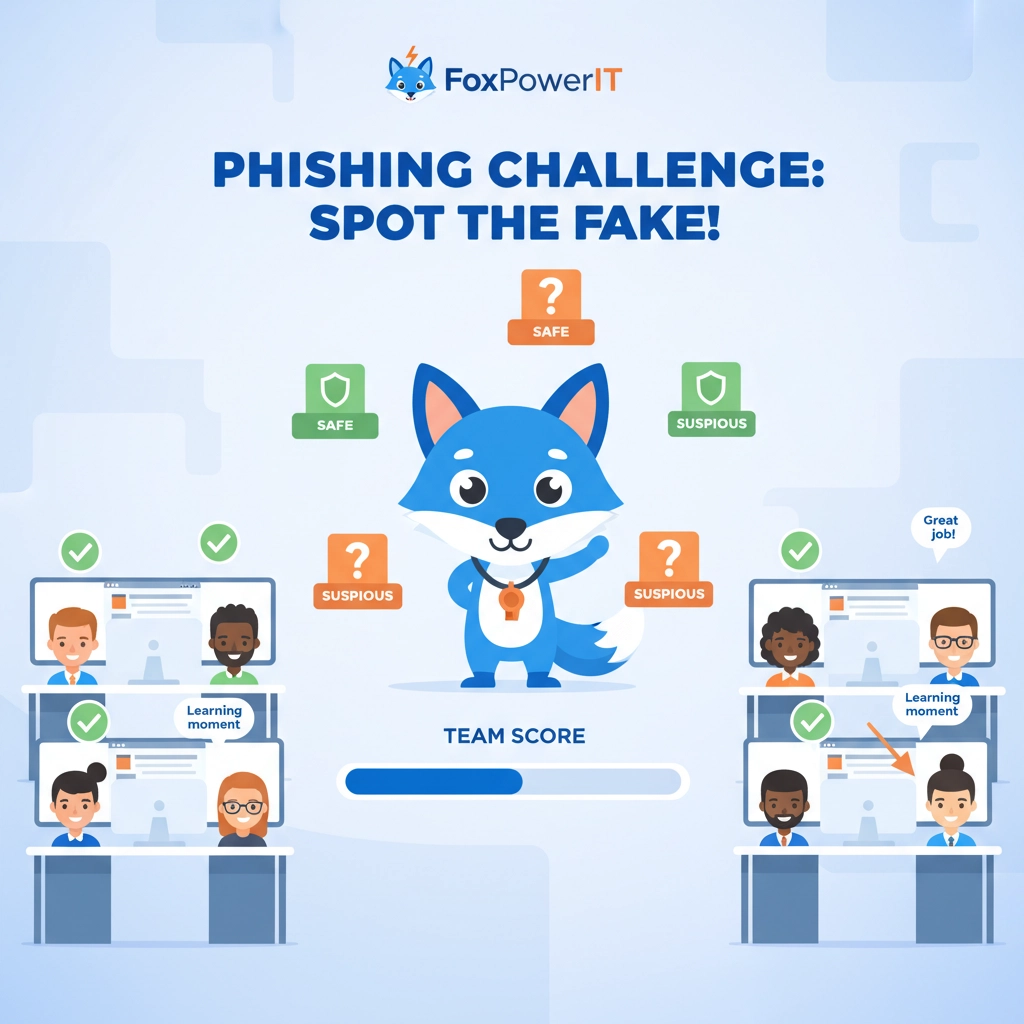Picture this: It's 8:30 AM on a Tuesday morning in Hartford. Sarah from accounting clicks on what looks like a routine invoice email. Within minutes, ransomware is spreading through your network faster than coffee gossip. Your team's first instinct? Panic, finger-pointing, and hoping someone else will fix it.
Now imagine a different scenario: That same email lands in Sarah's inbox, but this time she pauses, notices the suspicious sender domain, and immediately reports it to your IT team. Your network stays secure, your business keeps running, and Sarah gets a high-five from Smart Paws: your company's cybersecurity champion.

The difference between these two outcomes isn't luck or expensive security software. It's culture. And for Connecticut small businesses, building a strong cybersecurity culture isn't just nice to have: it's essential for survival.
Why Small Connecticut Teams Are Prime Targets
Here's the uncomfortable truth: cybercriminals love small businesses. While Fortune 500 companies have dedicated security teams and million-dollar budgets, your 15-person accounting firm in New Haven or your family-owned manufacturing company in Bridgeport often relies on basic antivirus and crossed fingers.
The numbers are sobering. Small businesses face cyberattacks at unprecedented rates, with phishing attempts increasing by 65% in the past year alone. Connecticut businesses, particularly in finance and healthcare sectors, are seeing targeted attacks that exploit exactly what makes small teams great: their personal relationships and informal communication styles.
But here's what most security experts won't tell you: technology alone won't save your business. The strongest firewall in the world can't protect against an employee who willingly hands over their password. That's where cybersecurity culture comes in, and that's where Smart Paws becomes your secret weapon.
The Smart Paws Approach to Security Culture
Think of Smart Paws as more than just FoxPowerIT's mascot: think of them as your team's cybersecurity coach. Smart Paws understands that security doesn't have to be scary, complicated, or the "IT department's problem." Instead, Smart Paws makes cybersecurity personal, memorable, and dare we say it: actually kind of fun.

The Smart Paws philosophy is simple: every employee is a security hero in training. Your receptionist who spots a suspicious phone call? That's Smart Paws-level thinking. Your sales manager who double-checks that client email before clicking the attachment? Pure Smart Paws instinct.
Building Your Foundation: Leadership That Actually Leads
Creating a cybersecurity culture starts at the top, but it doesn't start with fear tactics or boring policy documents. It starts with leadership that demonstrates security is a business priority, not just a compliance checkbox.
Make Security Personal for Leadership
Your management team needs to model the behavior they want to see. This means the owner should be the first person to complete security training, the first to use multi-factor authentication, and the first to admit when they almost fell for a phishing email.
Smart Paws suggests the "CEO Challenge": have your leadership team take the same security awareness quiz as your staff. When the boss struggles with identifying a fake Microsoft login page, it humanizes the challenge and shows everyone that cybersecurity learning is ongoing.
Integrate Security into Business Conversations
Stop treating cybersecurity as a separate agenda item that everyone endures. Instead, weave security considerations into normal business discussions. When planning a new client onboarding process, ask: "How do we keep their data secure?" When evaluating new software: "What are the security implications?"
This integration makes security feel like a natural part of doing business well, not an external burden imposed by the IT department.
Training That Actually Works: The Smart Paws Method
Forget about hour-long PowerPoint presentations about password complexity requirements. Nobody remembers those, and they certainly don't change behavior. Smart Paws training focuses on real scenarios your team actually encounters.
Micro-Learning That Sticks
Instead of quarterly security marathons, implement "Smart Paws Minutes": five-minute team discussions about real security situations. Start Monday morning meetings with questions like:
- "Sarah got an urgent email from 'the CEO' asking for employee W-2 forms. What should she do?"
- "Our vendor says they need remote access to fix a server issue. What questions should we ask first?"
- "Someone called claiming to be from our bank, asking to verify our account information. Red flag or legitimate?"
These brief, scenario-based discussions create muscle memory for real-world situations while keeping security top-of-mind without being overwhelming.
The Smart Paws Simulation Game
Turn phishing awareness into a friendly competition. Send fake (but obviously safe) phishing emails to your team, but frame it as the "Smart Paws Challenge." When someone spots the fake email, they get Smart Paws points. When someone clicks, they get extra Smart Paws training and encouragement: not punishment.
Track team-wide improvement over time and celebrate milestones. "This month, our team caught 95% of Smart Paws test emails: we're becoming cybersecurity ninjas!"

Creating Policies That People Actually Follow
Most cybersecurity policies fail because they're written by lawyers for lawyers, not by humans for humans. Smart Paws policies are different: they're practical, understandable, and actually useful.
The "Real Talk" Policy Approach
Instead of: "Users must implement complex passwords containing a minimum of eight characters, including uppercase, lowercase, numerical, and special characters."
Try: "Create passwords that would be hard for your ex to guess, but easy for you to remember. Mix words, numbers, and symbols in unexpected ways. 'Pizza42!Ninja' beats 'P@ssw0rd1' every time."
Visual Quick-Reference Guides
Create Smart Paws-branded quick-reference cards that employees can keep at their desks. Include:
- "Before I Click" checklist
- "Suspicious Email" warning signs
- "Who to Call" emergency contacts
- "Smart Paws Says" memorable tips
These physical reminders work better than buried policy documents because they're visible exactly when people need them most.
Building Security Champions Within Your Team
Every small Connecticut business has natural leaders: people others trust and turn to for guidance. These employees become your Smart Paws Security Champions, helping spread security awareness organically through your organization.
Identifying Your Natural Champions
Look for employees who:
- Ask thoughtful questions during training
- Help colleagues with technology issues
- Are generally trusted by their peers
- Show genuine interest in protecting the business
These team members don't need to be technical experts. Often, the best security champions are people like experienced administrative assistants or customer service representatives who understand how the business really operates.
Empowering Champions with Smart Paws Authority
Give your security champions specific responsibilities and recognition:
- Monthly "Smart Paws Security Updates" to share with colleagues
- Authority to pause suspicious activities and call for backup
- Special Smart Paws champion badges or recognition
- First access to new security tools and training
When Mary from accounting becomes a Smart Paws champion, suddenly security awareness has a friendly, familiar face instead of being just another corporate initiative.
Making Incident Reporting Safe and Productive
The biggest cultural shift for most small businesses is moving from "Don't screw up" to "When you spot something weird, speak up immediately." Smart Paws culture makes reporting potential security incidents feel like helping the team, not admitting failure.
The "No Blame" Smart Paws Promise
Publicly commit that anyone who reports a potential security issue: even if it turns out to be nothing: will be thanked, not criticized. Make this promise visible and stick to it religiously.
When Tom from sales reports that he "might have clicked something suspicious," the response should be: "Thanks for letting us know quickly: that's exactly what Smart Paws would do. Let's check it out together."
Creating Easy Reporting Channels
Security incident reporting should be as easy as ordering lunch. Provide multiple ways for people to report concerns:
- Direct phone line to IT support
- Simple email address (security@yourcompany.com)
- Anonymous online form
- Text message to designated security champion
The easier you make it to report potential issues, the faster you'll catch real problems before they become disasters.
Measuring Success: Smart Paws Metrics That Matter
Traditional cybersecurity metrics focus on technical indicators that most small business owners can't interpret. Smart Paws metrics focus on cultural indicators that show whether your team is actually getting stronger.
Cultural Health Indicators
- Number of security questions asked during team meetings
- Speed of incident reporting (how quickly suspicious activity gets flagged)
- Employee participation in voluntary security training
- Success rate on phishing simulations
- Number of proactive security suggestions from staff
Celebrating Progress
Make security improvements visible and celebratory. Create a Smart Paws "Security Wins" board where you highlight:
- Suspicious emails caught by alert employees
- Security suggestions implemented
- Training milestones achieved
- New security tools successfully deployed
Connecticut-Specific Considerations
Connecticut small businesses face unique challenges that Smart Paws culture addresses specifically:
Industry Compliance Requirements
Whether you're dealing with HIPAA in healthcare, financial regulations, or manufacturing standards, Smart Paws helps frame compliance as "doing right by our customers" rather than "avoiding penalties."
Regional Networking and Trust
Connecticut's tight business community means that security incidents can spread reputationally as quickly as they spread technically. Smart Paws culture helps preserve the trust-based relationships that make Connecticut business communities thrive.
Seasonal Workforce Considerations
Many Connecticut businesses scale up and down seasonally. Smart Paws provides quick-start security training that gets temporary employees up to speed quickly without compromising security standards.
Your Smart Paws Action Plan
Building cybersecurity culture doesn't happen overnight, but you can start seeing improvements immediately:
Week 1: Identify your potential security champions and have honest conversations about current security challenges.
Week 2: Implement "Smart Paws Minutes" in existing meetings: just five minutes of security-focused discussion.
Week 3: Create simple, visual security reminders for common workspaces.
Week 4: Establish easy incident reporting channels and publicize the "no blame" promise.
The goal isn't perfection: it's progress. Every Connecticut small business that embraces Smart Paws security culture becomes harder to attack and more resilient when attacks do occur.
Smart Paws knows that your people are your greatest security asset when they're properly trained, supported, and empowered. By focusing on culture first and technology second, you're not just protecting your business: you're building a team that sees security as part of their professional pride.
Ready to bring Smart Paws security culture to your Connecticut small business? The conversation starts with a simple question: "What would Smart Paws do?" And the answer is always the same: protect the pack, stay alert, and never stop learning.
For more information about building robust cybersecurity services for your Connecticut small business, including comprehensive IT security awareness training, connect with the Smart Paws team at FoxPowerIT. Because when it comes to cybersecurity, everyone deserves to be a hero.

